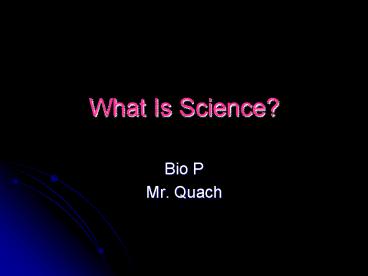What Is Science PowerPoint PPT Presentation
Title: What Is Science
1
What Is Science?
- Bio P
- Mr. Quach
2
What is science?
- Study of the natural world.
- What does natural mean to you?
- Science requires that we ask and answer questions.
3
How do they find answers?
- Scientific Method
- Observation stating the problem
- Usually asking a question
- Hypothesis explanations for the observation
- Also known as an educated guess
- Must be able to test it
- Prediction the expected outcome
4
- Experimentation Controlled attempts to test one
or more hypotheses. - Must use variables, different situations to test
the hypothesis. - Experimental control a variable that does not
change. - Compare results between the control and the
variables
5
- Conclusion Was the hypothesis correct or not?
- No change the hypothesis
- Yes hypothesis is correct
6
What is a theory?
- A hypothesis that has been REPEATEDLY TESTED with
little modification (change) and found to be
true. - What are several great theories?
- Cell Theory
- Theory of Evolution
- Gene Theory
7
What is the difference b/t a theory and a law?
- Theory explains why something happens
- Law states how it happens
- Law of Thermodynamics
- Law of Relativity
8
What is biology?
- Break it down
- bio life
- ology the study of something
- What other areas of study in biology can you
think of?
9
What are the categories of life?
10
What are some characteristics of living things?
- First of all they mean the same
- living thing organism
- 7 Themes of Biology
- Cellular structure and function
- Cells highly organized, tiny structures with
membranes - Reproduction production of offspring.
11
- 3. Metabolism sum of all chemical reactions in
the human body - 4. Homeostasis maintaining stability (balance)
within an organism. - 5. Heredity passing of genetic information from
parent to offspring. - 6. Evolution the process of change over time.
12
- 7. Interdependence how organisms interact with
other organisms and the environment
PowerShow.com is a leading presentation sharing website. It has millions of presentations already uploaded and available with 1,000s more being uploaded by its users every day. Whatever your area of interest, here you’ll be able to find and view presentations you’ll love and possibly download. And, best of all, it is completely free and easy to use.
You might even have a presentation you’d like to share with others. If so, just upload it to PowerShow.com. We’ll convert it to an HTML5 slideshow that includes all the media types you’ve already added: audio, video, music, pictures, animations and transition effects. Then you can share it with your target audience as well as PowerShow.com’s millions of monthly visitors. And, again, it’s all free.
About the Developers
PowerShow.com is brought to you by CrystalGraphics, the award-winning developer and market-leading publisher of rich-media enhancement products for presentations. Our product offerings include millions of PowerPoint templates, diagrams, animated 3D characters and more.

